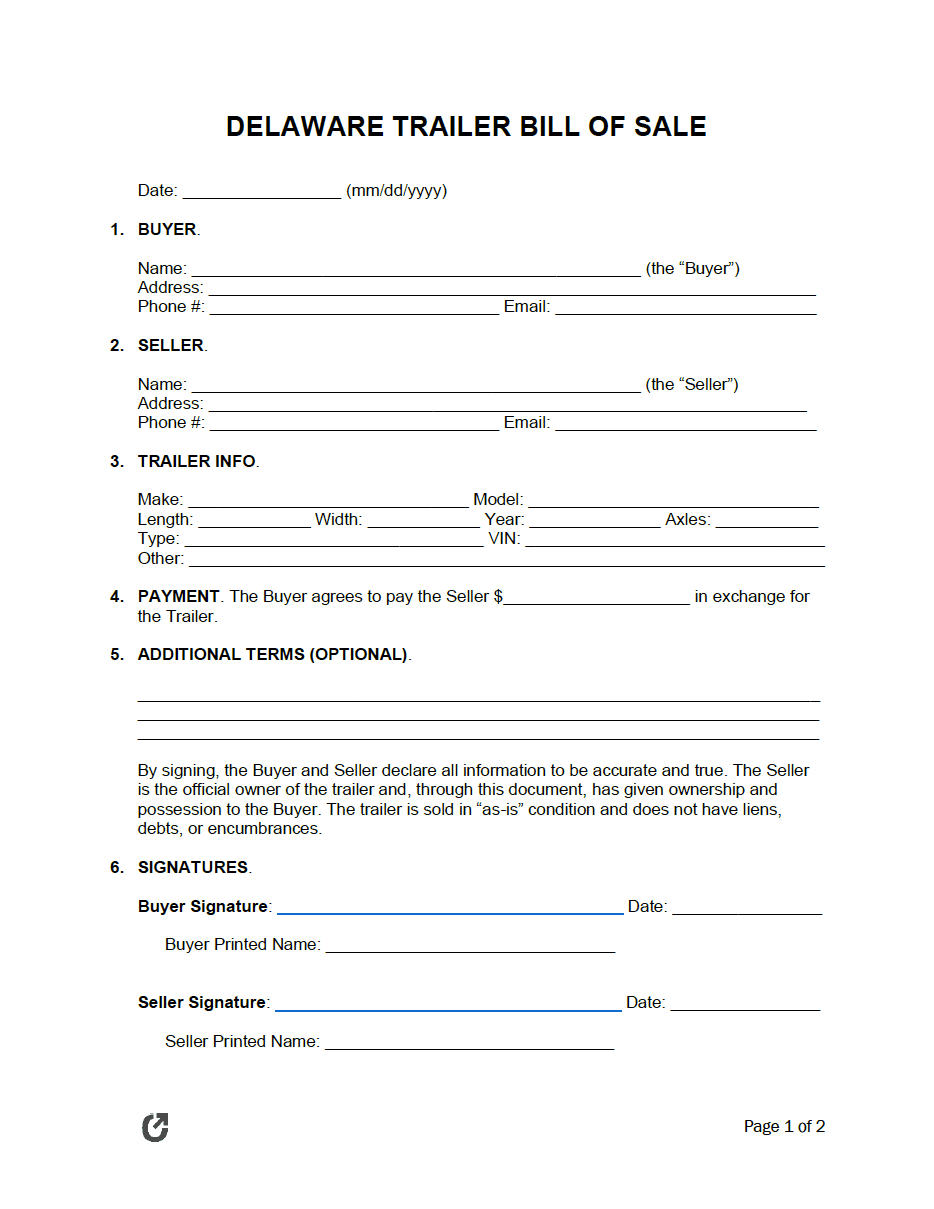Delaware Trailer Bill of Sale Form
A Delaware trailer bill of sale form classifies the buyer as the purchaser of a trailer and the owner as the person selling it. Utility, boat, and specific farm trailers fit under this category as they generally weigh less than other types. Their purpose also determines registration and titling needs in the state. Private and commercial trailers have specific differences in their use and physical appearances. Therefore, the state categorizes them separately and has unique requirements for both.
|
What is a Delaware Trailer Bill of Sale?
A Delaware trailer bill of sale captures the exchange of a tow-behind carrier for cash or trade. Before downloading or printing the form, the individual purchasing the trailer (the buyer) discusses the deal with the owner (the seller). Once they both agree to the conditions of the sale, they use the bill of sale to record the transaction’s elements.
Buyers cannot set up payment plans with sellers using a bill of sale form. Instead, they would need to use a purchase agreement. Otherwise, the buyer must pay the seller the total amount listed in the document. When the transfer of funds (or trade) happens, the payee gives up ownership and gives the trailer to the payer.
How to Register a Trailer (3 Steps)
Delaware requires residents to register and title their trailer(s). Individuals must register within sixty (60) days of establishing residency. Residents who purchased a trailer in-state must obtain tags within thirty (30) days. The DMV charges penalty fees for applicants who do not meet the deadline.
If an owner possesses both a car and trailer, the DMV allows them to sync up their registration periods. For example, if the person’s car registration expires in seven (7) months, they can give the trailer a seven (7) month registration. From that point forward, the owner can renew the vehicle and trailer’s registration simultaneously (§ 2109(b)).
Step 1 – Title the Trailer
Per state law, a utility or boat trailer owner must title it before registering. The buyer must provide the DMV with the completed title (if previously owned), application, identification, and payment.
If the purchase happens by private sale, the buyer and seller should go to the DMV to transfer the title. This process verifies the transfer of the new title to the buyer and the removal of the owner’s name. A Motor Vehicle Title Specialist also reviews the documents from both parties. They request corrections immediately, which speeds up the titling process.
Non-residents who keep their trailers in the state year-round can qualify for a Delaware title and registration. They must provide the required forms and a signed non-resident affidavit (Form MV725).
Step 2 – Register the Trailer
After the buyer has the title in hand, they must register the trailer. The person applying must bring the requested forms, ensuring the required individuals have signed them. DMV offices only accept original documents, not photocopies.
Bring the Following:
|
Step 3 – Renew
The registration’s effective period begins on the issuing date of the title. It lasts for six (6), twelve (12), or twenty-four (24) months. The owner can also set an expiration between one (1) and twelve (12) months to match their vehicle’s renewal date.
Renewals can happen through the online portal or by using the DMV’s drive-thru services. Residents can also reapply by calling the office or sending the forms via mail.
| Mailing Address: |
| Delaware Divison of Motor Vehicles Vehicle Services Help Desk P.O. Box 698 Dover, Delaware 19903 |
